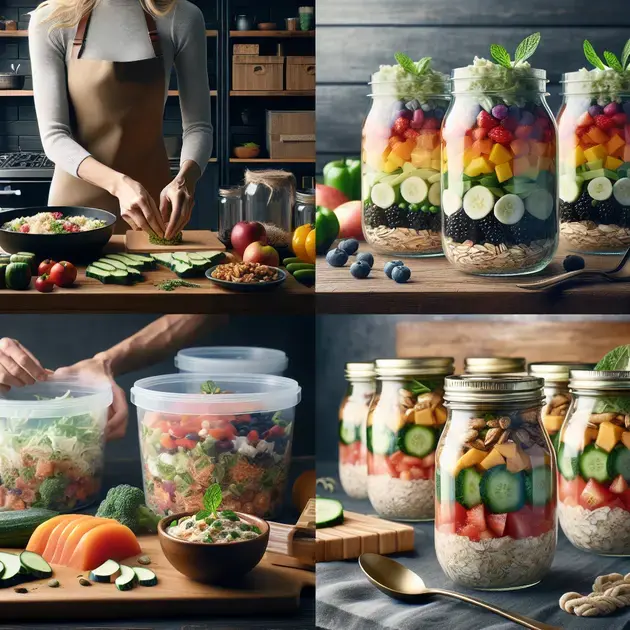Achieving weight loss can be a challenging journey, but with the right foods, it becomes more manageable. In this comprehensive guide, we will explore a variety of weight-loss friendly foods that can assist you in shedding pounds effectively.
According to recent studies, incorporating foods rich in fiber, protein, and healthy fats into your diet can promote satiety and support weight loss efforts. By making smart choices and including these foods in your daily meals, you can not only achieve your weight loss goals but also improve your overall health and well-being.

Achieving Your Weight Loss Goals
The journey towards achieving your weight loss goals can be challenging, but with dedication and the right strategies, success is within reach. Here are some practical steps to help you on your weight loss journey:
1. Set realistic and achievable goals: Start by setting specific and measurable goals for your weight loss journey. Use a reliable weight loss tracking app like MyFitnessPal to set goals and track your progress.
2. Incorporate regular exercise into your routine: Physical activity plays a crucial role in weight loss. Consider using a fitness app like Nike Training Club or Fitbod to create personalized workout plans tailored to your fitness level and goals.
3. Monitor your food intake: Keeping track of your daily food intake can help you make healthier choices and stay within your calorie goals. Use an app like Lose It! or MyPlate to log your meals and monitor your nutrient intake.
4. Stay hydrated: Drinking an adequate amount of water is essential for overall health and can also support weight loss efforts. Consider using a hydration tracking app like Hydro Coach to ensure you’re meeting your daily water intake goals.
5. Get enough sleep: Quality sleep is crucial for weight loss and overall well-being. Use a sleep tracking app like Sleep Cycle to monitor your sleep patterns and make adjustments to improve your sleep quality.
The Power of Fiber, Protein, and Healthy Fats
When it comes to achieving your weight loss goals, focusing on consuming adequate fiber, protein, and healthy fats can make a significant difference. Here’s why these nutrients are essential for weight loss:
Fiber: Fiber-rich foods help you feel full and satisfied, reducing the likelihood of overeating. Aim to include sources of fiber such as fruits, vegetables, whole grains, and legumes in your meals. Apps like Cronometer or MyNetDiary can help you track your fiber intake and make sure you’re meeting your daily requirements.
Protein: Protein is important for preserving lean muscle mass and promoting feelings of fullness. Include sources of lean protein such as chicken, fish, tofu, and legumes in your diet. Use a tracking app like MyMacros+ or MyFitnessPal to monitor your protein intake and adjust as needed.
Healthy Fats: Incorporating healthy fats like avocados, nuts, seeds, and olive oil into your meals can support satiety and nutrient absorption. Use an app like FatSecret or Carb Manager to track your fat intake and ensure you’re consuming the right balance of fats.
By prioritizing fiber, protein, and healthy fats in your diet, you can enhance your weight loss journey and improve your overall health and well-being.
Make Smart Food Choices for Weight Loss
Choosing the right foods is key to achieving your weight loss goals. Here are some tips for making smart food choices to support your weight loss journey:
1. Opt for whole, nutrient-dense foods: Focus on incorporating whole foods like fruits, vegetables, whole grains, and lean proteins into your meals. Avoid processed and high-sugar foods that can derail your weight loss efforts.
2. Plan your meals ahead of time: Meal planning can help you make healthier choices and avoid impulsive eating. Use a meal planning app like Mealime or Prepear to plan your meals for the week and create shopping lists.
3. Practice portion control: Pay attention to your portion sizes and avoid oversized servings. Apps like Portion Control or MyPlate can help you visualize appropriate portion sizes and prevent overeating.
4. Cook at home more often: Cooking your meals at home gives you more control over the ingredients and cooking methods used. Explore healthy recipes on apps like Yummly or Allrecipes to discover delicious and nutritious meal ideas.
5. Listen to your body’s hunger and fullness cues: Eat mindfully and pay attention to your body’s signals of hunger and fullness. Apps like Rise Up can help you develop mindful eating habits and improve your relationship with food.

Healthy Meal Prep Ideas for Weight Loss
Meal prep is essential for those looking to achieve weight loss goals. By planning and preparing your meals in advance, you can ensure that you are making healthy choices and avoiding the temptation of fast food or unhealthy snacks. Here are some healthy meal prep ideas to help you on your weight loss journey:
1. Batch Cooking
Choose one day of the week to dedicate to batch cooking. Prepare large quantities of lean proteins, such as grilled chicken or tofu, and whole grains, like quinoa or brown rice. Portion out these items into individual containers for easy grab-and-go meals throughout the week.
2. Pre-cut Fruits and Vegetables
Having pre-cut fruits and vegetables readily available makes it easier to reach for a healthy snack instead of processed foods. Wash, peel, and chop your favorite produce and store them in containers in the fridge for quick and convenient access.
3. Overnight Oats
Prepare a week’s worth of overnight oats by combining oats, Greek yogurt, and your choice of fruits and nuts in mason jars. These make for a nutritious and filling breakfast option that you can customize to suit your tastes.
4. Salad in a Jar
Layer your favorite salad ingredients in a mason jar for a portable and mess-free meal option. Start with the dressing at the bottom, followed by hearty vegetables, proteins, grains, and leafy greens. When you’re ready to eat, simply shake the jar to mix everything together.
5. Freezer-friendly Meals
Cooking and freezing meals in advance can save you time and prevent the urge to order takeout. Prepare dishes like soups, stews, and casseroles in bulk, portion them out, and store them in the freezer for a convenient and healthy meal option when you’re short on time.
The Benefits of Hydration for Weight Loss Success
Staying hydrated is crucial for overall health and can also support weight loss efforts. Water plays a key role in various bodily functions, including metabolism and digestion. Here are the benefits of hydration for weight loss success:
1. Increased Metabolism
Drinking an adequate amount of water can boost your metabolism and help your body burn calories more efficiently. Dehydration can slow down your metabolism, making it harder to lose weight.
2. Appetite Control
Oftentimes, thirst is mistaken for hunger. Staying hydrated can help curb unnecessary snacking and overeating, leading to a reduction in calorie intake and potential weight loss.
3. Improved Digestion
Proper hydration supports healthy digestion by keeping your digestive system running smoothly. Water aids in the breakdown of food and absorption of nutrients, preventing issues like bloating and constipation.
4. Workout Performance
Being well-hydrated is essential for optimal workout performance. Water helps regulate your body temperature, lubricate joints, and transport nutrients to muscles, allowing you to exercise longer and more effectively.
5. Detoxification
Hydration is essential for flushing out toxins from the body through urine and sweat. By drinking enough water, you can support your body’s natural detoxification processes and promote overall health and weight loss.
Effective Strategies for Incorporating Exercise into Your Weight Loss Journey
Exercise is a key component of any weight loss journey, helping to burn calories, build muscle, and improve overall health. Here are some effective strategies for incorporating exercise into your daily routine:
1. Find Activities You Enjoy
Choose exercises that you find enjoyable and sustainable, whether it’s dancing, hiking, cycling, or swimming. By engaging in activities you like, you’re more likely to stay motivated and committed to your fitness goals.
2. Set Realistic Goals
Establish achievable fitness goals that align with your weight loss objectives. Start with small milestones and gradually increase the intensity and duration of your workouts as you progress. This approach can help prevent burnout and injuries.
3. Schedule Regular Workouts
Make exercise a part of your daily routine by scheduling regular workout sessions. Set aside specific times during the week for physical activity and treat them as non-negotiable appointments to prioritize your health and fitness.
4. Mix Up Your Routine
Vary your workouts to prevent boredom and challenge different muscle groups. Incorporate a mix of cardiovascular exercises, strength training, flexibility exercises, and recreational activities to keep your body engaged and continuously improving.
5. Track Your Progress
Keep track of your fitness journey by recording your workouts, measurements, and achievements. Tracking your progress can help you stay motivated, identify areas for improvement, and celebrate your success along the way.
Conclusion
In conclusion, implementing healthy meal prep ideas such as batch cooking, pre-cut fruits and vegetables, overnight oats, salad in a jar, and freezer-friendly meals can greatly support your weight loss journey. These strategies not only save time but also ensure that you have nutritious options readily available, reducing the temptation of unhealthy choices.
Moreover, understanding the benefits of hydration for weight loss success underscores the importance of staying adequately hydrated. From boosting metabolism to aiding digestion and improving workout performance, water plays a vital role in overall health and weight management. By prioritizing hydration, you can enhance the effectiveness of your weight loss efforts.
Lastly, incorporating exercise into your weight loss journey through activities you enjoy, realistic goal setting, regular workout schedules, varied routines, and progress tracking is crucial for sustainable results. Exercise not only burns calories but also helps in building muscle, improving fitness, and supporting overall well-being.